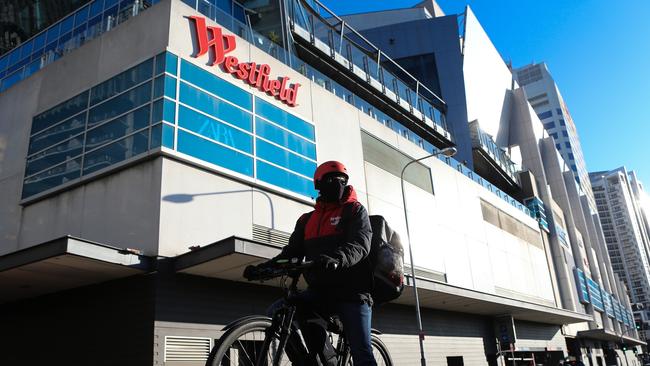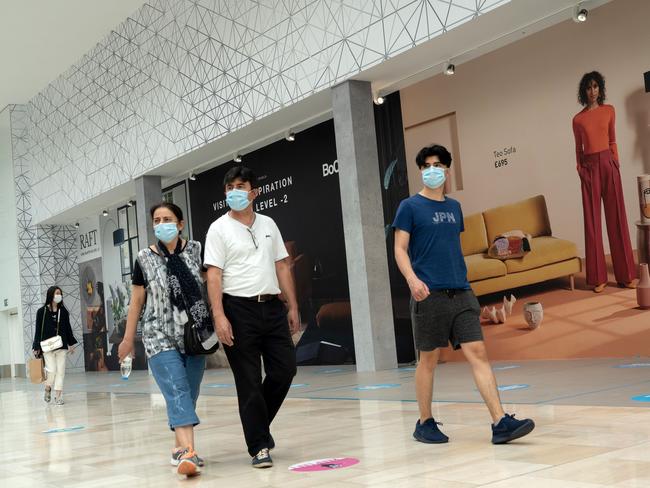Westfield owners tap markets for billions as pandemic bites, with Scentre better off than Unibail-Rodamco-Westfield
As the pandemic up-ends the mall industry, the local and global owners of Westfield centres are shoring up their balance sheets.

The two companies that own the local and international Westfield shopping centre empires have laid out plans to raise close to $19bn via massive injections of debt and equity alongside asset sales as the coronavirus pandemic rips through the industry.
Local Westfield owner, the Scentre Group, on Thursday unveiled a $4.1bn hybrid issue in the United States that will allow it to slash its gearing as it deals with plunging shopping centre values and an effective freeze in the market for regional malls.
Meanwhile in Europe, French company Unibail-Rodamco-Westfield, which bought the international Westfield empire in a $32bn deal orchestrated by Sir Frank Lowy in 2018, has announced a €9bn ($14.55bn) rescue plan as the coronavirus crisis poses further problems for its European and American property holdings.
Unibail is seeking to undertake a discounted €3.5bn equity raising, which Scentre has managed to avoid for now by undertaking the hybrid issue. Scentre’s shares were up by 2.6 per cent to $2.33 in early morning trade. By contrast, Unibail secondary units on the ASX dropped 5 per cent to $3.03.
The travails of both companies show the pressure on the malls industry, but also demonstrates the willingness of lenders to support well-capitalised companies through the pandemic despite billions of dollars being wiped from their property portfolios.
Scentre on Thursday priced a $US3bn ($4.1bn) subordinated hybrid note issue in the United States market, with the raising larger than anticipated by investment analysts, who had suggested a $US2bn issue.
The move will take the heat off the mall owner as it seeks to boost rent collections and get its 42 shopping centres back on track in the wake of coronavirus shutdowns.
The hybrid note issue comprises $US1.5bn non-call six-year subordinated notes with a coupon of 4.75 per cent and $US1.5bn non-call ten-year subordinated notes with a coupon of 5.125 per cent.
They have a 60-year maturity date and can be redeemed by Scentre at par with cash from the call date and do not contain equity conversion features. The issue was the company’s first move into the hybrid market and is expected to be a long-term feature of its funding, diversifying away from banks. It is also much cheaper than raising equity, as some market players had tipped.
Westfield centres in Australia and New Zealand have been battered by the coronavirus pandemic but the group said it now had sufficient long-term liquidity to cover all debt maturities to early 2024. The notes will receive a 50 per cent equity credit from the rating agencies and on this basis Scentre’s debt to earnings at the end of June would be 6.4 times.
The hybrid notes are not included as liabilities for bank and bond covenants so gearing at the end of June would be slashed to 27.6 per cent, giving it a substantial buffer even if shopping centre values fall further, as analysts have warned.
The local Westfield owner revealed that, subject to unforeseen circumstances, its “current intention” was to make a distribution in early 2021 from surplus net operating cash flows during the current half.
“We are pleased with the successful issuance overnight of subordinated notes. The issuance diversifies the group’s capital base by introducing a new long term funding source – further strengthening our financial position in a way that preserves value for our security holders,” a Scentre spokeswoman said.
Meanwhile, Unibail will cut its distributions as it deals with the pandemic, which has seen its share price collapse as investors question the future of large shopping malls in global capitals.
Unibail said the fully underwritten €3.5bn capital raise would be used to immediately reduce leverage and it would limit cash dividends through scrip or a lower payout ratio, resulting in €1bn cash savings over the next two years.

It would cut another €800m from its development and non-essential operating expenditure and complete €4bn of disposals expected to be completed by year-end 2021.
The plan is designed to keep an investment grade credit rating, with an expected rating of A- (3)/Baa1, and maintain a sustainable capital structure with gearing below 40 per cent and net debt to earnings below nine times.
Unibail has already sold down €4.8bn since June 2018 at a 5 per cent premium to book value, including five French retail assets in the middle of the COVID-19 crisis in line with the prior unaffected appraisal. It has identified another €6bn-plus of assets to sell and said €1bn of disposals were well advanced.
Chief executive Christophe Cuvillier said the immediate priority is to deleverage, primarily through asset disposals. “However, given the uncertainties around the duration of the COVID-19 pandemic and the recovery, we have decided, as a matter of prudent management, to substantially strengthen our balance sheet, in order to maintain a robust investment grade credit rating and to ensure flexibility in a world that is unpredictable and requires agility,” he said.
Unibail would “fully embrace” the changing retail environment via its flagship destination strategy and capitalise on the portfolio‘s mixed-use potential. “On the operational front, we see continued improvement in footfall and tenant sales, and are making steady progress in our tenant negotiations,” he said.
Morgan Stanley analysts said they were “surprised” that Unibail was seeking permission to raise equity ahead of its planned disposals.
“Our concern would be that a meaningful portion of investors may still consider the group‘s disposal targets as overly ambitious, owing to limited investment market appetite, and could therefore question whether €3.5 billion is sufficient,” they wrote in a note to clients.




To join the conversation, please log in. Don't have an account? Register
Join the conversation, you are commenting as Logout